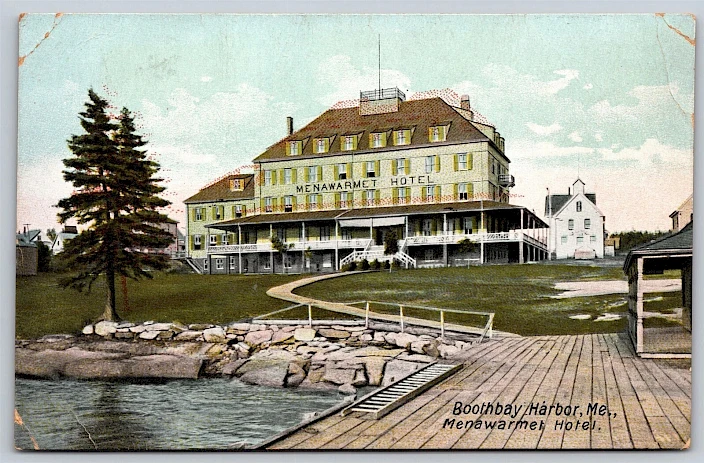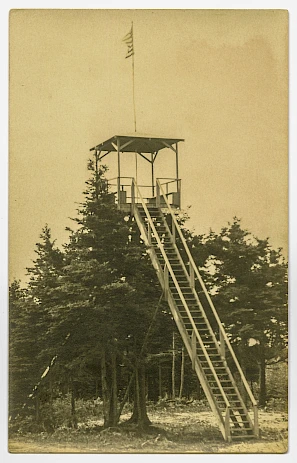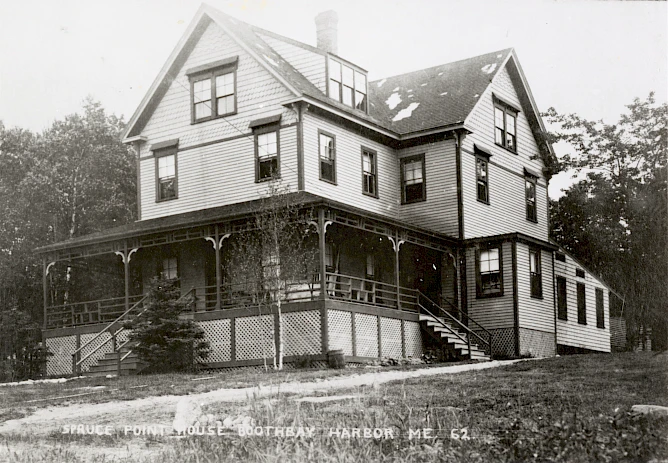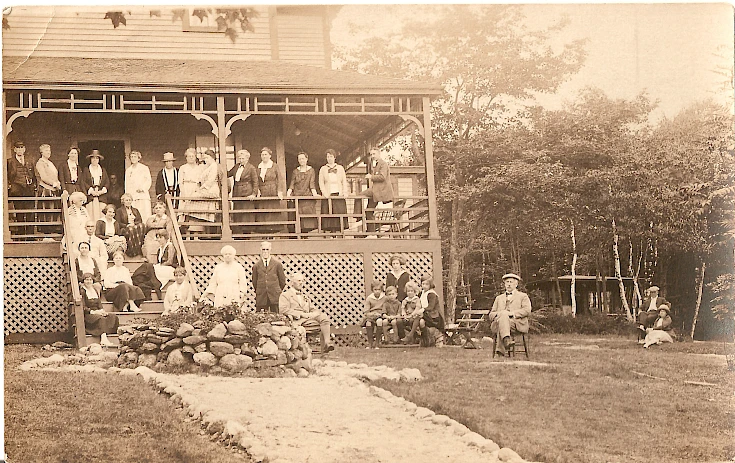A Brief History of the Boston & Boothbay Land Company
Arrival of the Rusticators
In the late 19th century, the Maine coast offered more than beauty— it offered escape. By the 1870s, steamer service to Boothbay Harbor brought travelers north from Boston and New York, eager to exchange summer heat for sea breezes, fishing lines, and shaded porches. These early visitors were known as rusticators: urban professionals drawn to the thrill of the wild and the rituals of relaxed refinement: hunting and fishing by day, fine whiskey and conversation by night. The undeveloped land around Boothbay Harbor, including Spruce Point, was the site of fishing and hunting camps each summer, catering to visitors in pursuit of striped bass, small game, and the healthy Maine air.
The Boston & Boothbay Land Company
Sensing the cultural shift as many more Americans began dreaming of Vacationland, a group of investors banded together to form the Boston & Boothbay Land Company in 1888. The company purchased land on the east side of Boothbay Harbor, including 140 acres on Spruce Point. On their land closer to the head of the harbor, near where the Catholic Church is today, they built a grand resort hotel called The Menawarmet, which opened on July 20th 1889 with 60 rooms, tennis courts, croquet, billiards, an orchestra, and eas served by eigh steamsers a day on the hotel's 130 foot wharf. On the 140 acres on Spruce Point, they envisioned a summer colony with cottages, a clubhouse, a pier, and space to relax, rusticate, and enjoy the pleasures of the Maine summer season.

The clubhouse was the first building that they put up on the peninsual, followed by a pier and then an observation tower. The pier is was the front door of the comings and goings of these new visitors. The clubhouse was initially intended to host prospective buyers who were visiting for the night and considering building a cottage for themselves in the new summer colony, dubbed Spruce Point. The observation tower was a sales tool to help give prospective buyers a bigger picture look at the stunning peninsual that they were standing on and help them see the vision for a summer colony of picturesque, rustic cottages nestled into the landscape of this one-of-a-kind place. From arrival to departure, prospective buyers were entertained with hunting and fishing trips, convivial meals, and the spectacular coastal scenery.

According to the July 4, 1889 edition of the Pemaquid Messenger:
“The Boston & Boothbay Land Co. owns about 140 acres of land comprising the end of Spruce Point, a valuable summer resort property. It has been carefully surveyed with broad streets and avenues laid out. A steamboat wharf has been built, some of the streets and avenues have been graded, and a clubhouse has been built. With these two land companies in active operation, Boothbay Harbor is bound to grow rapidly as a summer resort.”
The Boston & Boothbay Land Company got pretty good at being host, between the Menawarmet and the hospitality they were engaged in at the nascent summer colony on the peninsula. The investors did sell some of their house lots, mostly along where Grand View Ave, and several shingled cottages were built along the way to the Spruce Point clubhouse building. But the company faced a problem: the town’s water supply reached only as far as the new clubhouse, preventing the company from servicing the dozens of roads and cottage plots they had surveyed. Without a solution, the partners were forced to scale back their ambitions. It would not be until 1919—nearly thirty years later—that town water and sewer were extended to Spruce Point. In the meantime, vast swaths of the company’s land remained in their natural state, sparing the peninsula from the kind of dense cottage development that transformed other parts of Maine’s coast.

Making the best of the situation, the Land Company leaned into hospitality. They appointed one of their own, Charles A. Marston of Skowhegan, to manage the clubhouse as a seasonal hotel, formally christened the Spruce Point House. Friends, clients, prospective buyers, and eventually the public arrived each summer to experience a style of coastal retreat that was adventurous yet sociable—fishing trips by day, porch gatherings by night. As you've probably surmized by now, the clubhouse is what today forms the historic core of our Spruce Point Inn.
An 1890 edition of the Maine Industrial Journal reports:
The annual meeting of the Boston & Boothbay Land Co., was held Friday, Feb. 21st, at the Preble House, Portland. Officers were elected as follows: President, Selden Connor; vice President, Manley T. Pooler; Treasurer, Sanford C. Chase; Clerk, Charles A. Marston; Attorney, J. W. Spaulding. The company will make extensive improvements on their land at Spruce Point, Boothbay Harbor, and will make an addition to the Spruce Point House. Several cottage lots have been sold to be built upon this season.
Even as lot sales proved slower than hoped, the lodge thrived as a hub of hospitality, setting in motion the tradition that defines Spruce Point Inn today. The Menawarmet hotel eventually burned down in 1913 and within a few years the Boston & Boothbay Land Company itself dissolved. But the Spruce Point momentum continued and through the following decades it evolved into the resort that we know and love today. And you can learn more about that evolution here!
Legacy of a Beginning
Though the Boston & Boothbay Land Company itself was relatively short-lived, its impact endures. The roads it surveyed became the walking trails and avenues guests still wander. The wharf it built connected the peninsula to steamer routes that funneled travelers from Boston, creating the first summer traditions on our shores. And the water limitations that once frustrated its investors left behind an unexpected gift: acres of woodland and shoreline that remain intact, preserving the peninsula’s natural character. The company may have envisioned a summer colony, but in the process it founded something more lasting— a lodge and landscape that continue to welcome generations of rusticators, vacationers, and coastal dreamers more than a century later.

